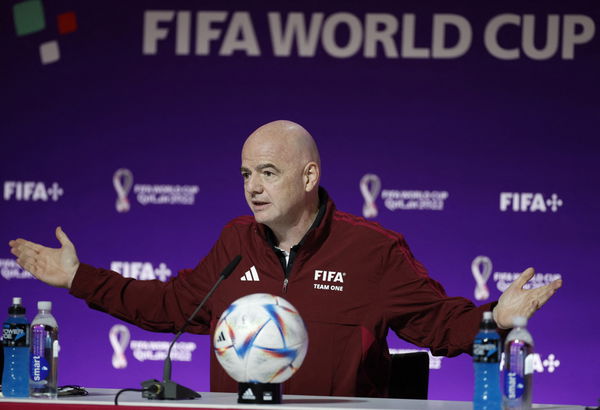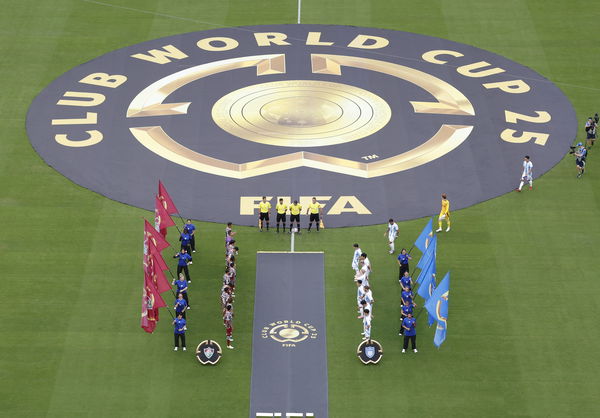
via Reuters
Soccer Football – FIFA World Cup Qatar 2022 – Referees Media Briefing – Main Media Center, Doha, Qatar – November 18, 2022 FIFA president Gianni Infantino at the briefing REUTERS/John Sibley

via Reuters
Soccer Football – FIFA World Cup Qatar 2022 – Referees Media Briefing – Main Media Center, Doha, Qatar – November 18, 2022 FIFA president Gianni Infantino at the briefing REUTERS/John Sibley

“Make Football truly global, diverse, and inclusive, for the benefit of the entire world.” That’s the vision FIFA promotes, viewing the beautiful game as more than just a sport—using it as a bridge to break barriers and unite people across the globe. But sadly, as inspiring as this sounds, the reality is far from it, especially when looking at how the apex authority of soccer is handling the hefty ticket prices for the upcoming 2026 FIFA World Cup.
Watch What’s Trending Now!
Set to be hosted in the USA, Canada, and Mexico, the tournament will debut its expanded format with 48 teams. Yet, not even half of them have booked their place, let alone finalized fixtures. Still, fans are already desperate to secure tickets. Unfortunately, this has created a loophole for stakeholders to gauge ticket prices. For context, a report from Fotmob revealed that tickets for the final at MetLife Stadium, New Jersey, are priced as high as a staggering $38,000! While FIFA is the obvious first name to blame, the matter is more complicated.
Much of the price surge stems from secondary market reselling. Still, it’s an issue FIFA cannot afford to ignore—at least that’s what renowned journalist Adam Crafton believes. “This is an ‘America problem’ but FIFA had chance to distinguish soccer as a sport that does things differently to others, that wants to grow, be accessible, and reach bigger audiences. Instead, they’ve chosen the cover of “local market conditions” and a cash grab,” he wrote on X while retweeting some insights of another renowned journalist, Tom Bogert.
ADVERTISEMENT
Article continues below this ad
The tickets had gone on sale on Wednesday, but not everyone had access to the ticket window. That’s because Gianni Infantino and Co. had earlier introduced a first phase of buying tickets in September, where they ended up receiving a whopping 4.5 million applications for a spot in the purchase window. So it’s hard to say that everyone got a chance to buy the tickets, and that’s exactly where the secondary market enters, a place that gauges prices on its own terms.
Then again, who said the official market itself was a relief for the fans? Hard to imagine, but FIFA’s ticket price schedule was itself quite a shocker for the supporters around the world. Consider the opening games in each host nation, the cheapest seats were for Canada’s opener in Toronto, ranging from $355 to $1,745. The U.S. men’s national team’s first game in Los Angeles carried a price tag between $560 and $2,735, while Mexico’s opener in Mexico City fell between $370 and $1,825.
ADVERTISEMENT
Article continues below this ad
This is an America problem but FIFA had chance to distinguish soccer as a sport that does things differently to others, that wants to grow, be accessible and reach bigger audiences. Instead they’ve chosen the cover of “local market conditions” and a cash grab https://t.co/n3nltpVtlb
— Adam Crafton (@AdamCrafton_) October 3, 2025
As for the grand finale at MetLife Stadium in East Rutherford, N.J., tickets started at $2,030 and went up to $6,370. Given how steep these official prices already were, it’s little surprise that resale platforms have sent costs soaring even higher. No wonder journalist Tom Bogert had only a logical reaction to share: “It sucks, the prices.” Keeping aside the matter of supply and demand, Bogert insists that FIFA or even the secondary market, for that matter, has no right to steal the game from its supporters by keeping such difficult prices.
“Football’s for the people. Why are we price gouging? This is an infestation, I think, as well, of the secondary ticket market. Your scalpers are in here with no other idea than to get tickets to sell them at a higher price rather than to the fans. I wish that there were a better system,” slammed Bogert in the latest discussion with CBS Sports Golazo, alongside the panel of host Lisa Carlin, sports influencer Aaron West, as well as ex-Irish women’s national team star Jen Beattie.
Tom emphasized the need for a system that ensures fans entering the lottery are genuinely attending the matches with their families, rather than scalpers exploiting the process for profit. He argued that too many participants view it as an opportunity to make hundreds of dollars instead of creating lifelong World Cup memories with loved ones and fellow supporters. Of course, he wasn’t alone in sharing such a sentiment.
FIFA might face a ‘quiet’ atmosphere at the 2026 World Cup!
In a similar conversation, Jen Beattie expressed her disappointment with the World Cup ticket prices. “It’s so frustrating because at the start, I was pumped, thinking, ‘Let’s go, tickets on sale, how do we get them? Got any freebies, mate?” But after seeing the pricing, that smile on Beattie’s mouth turned upside down. “How unfair that is to lifelong soccer fans, new soccer fans,” she said, expressing her dissent over the resale markets that are reselling the tickets at unfair prices.
The former WSL and NWSL insisted that avid soccer fans are on the ticket platforms only for the sake of the game, unlike the resellers, who aren’t and are eyeing quick profit. Jen Beattie also demanded a better system to ensure that such situations do not put everyone in a difficult situation. Indeed, she couldn’t have been more right. And if FIFA doesn’t ensure this, then they shall brace themselves for worst-case scenarios.
Do you recall the 2025 FIFA Club World Cup? As much as everyone was excited for the tournament, the ticket prices made everyone seem to lose interest in the game. So much so that the Club World Cup struggled with filling stadiums. Not to mention that with several fixtures scheduled in the afternoons, full stands became a rarity throughout the event.
To make matters worse, sluggish sales pushed FIFA to repeatedly slash prices. In one striking case, tickets for the Chelsea vs Fluminense clash tumbled from $475 to just $13 within days, leading players themselves to post Ticketmaster links on social media, urging fans to buy tickets and show up for the match. And believe it or not, the same might be the situation during the 2026 FIFA World Cup, at least Aaron West puts it differently.

via Imago
Ulsan HD and Fluminense FC line up before the start in the Group F – Match 27 FIFA Club World Cup match at MetLife Stadium in East Rutherford, NJ on Saturday, June 21, 2025. PUBLICATIONxINxGERxSUIxAUTxHUNxONLY NYP20250621105 JOHNxANGELILLO
Slamming FIFA and the resellers for constantly driving up the ticket prices, he shared a warning saying, “The atmosphere in these stadiums is not going to be the same if you don’t have real soccer fans.” The digital creator insisted that the stadium will be filled with a bunch of corporate people and influencers. Oh, to remind, like the soccer world witnessed the most unexpected collab between renowned YouTuber and internet sensation Darren Watkins Jr, a.k.a. ISHOWSPEED, and the President Gianni Infantino.
“It’s going to be quiet… the energy won’t be there,” added Aaron West. “This game is for the people, and we continue to push the people away from the game. Where are we going with this? Who is going to be in the stands in the future if we keep doing this? It’s just going to be empty stands and a box full of executives.”
ADVERTISEMENT
Article continues below this ad
Indeed, a serious question that FIFA shall answer by taking its time. Everyone knows that they have been conducting this tournament for decades, and such a problem was hardly witnessed if one compares the ticket prices of the previous edition. No wonder that initially, fingers were raised on the host nation, citing ‘American problem.’
Do you think that’s the case? Let us know in the comments.
ADVERTISEMENT
ADVERTISEMENT
ADVERTISEMENT
ADVERTISEMENT


